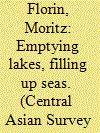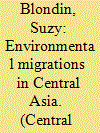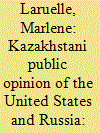|
|
|
Sort Order |
|
|
|
Items / Page
|
|
|
|
|
|
|
| Srl | Item |
| 1 |
ID:
165964


|
|
|
|
|
| Summary/Abstract |
In the last two decades, mobile phones and new technologies have transformed migration. Some scholars argue that they help empower migrants, who are otherwise often marginalized in their host country. We discuss the extent to which this is true for Kyrgyz labour migrants in Russia, a relatively large diaspora that suffers from multiple levels of disempowerment, ranging from precarious living and working conditions to a lack of legal support and representation from their home government. Relying on fieldwork conducted in Kyrgyzstan in 2017 and 2018, we explore the extent to which smartphones are enabling Kyrgyz labour migrants in Russia to be informed about migration rules, help each other abroad, connect as a diaspora, and discuss important diaspora topics. Our findings are relevant beyond academia, as many international and governmental agencies are trying to assist migrants through technology; they also point to several missed opportunities for these organizations.
|
|
|
|
|
|
|
|
|
|
|
|
|
|
|
|
| 2 |
ID:
165967


|
|
|
|
|
| Summary/Abstract |
Research into post-independence identity shifts among Kazakhstan’s Russian-speaking minorities has outlined a number of possible pathways, such as diasporization, integrated national minority status and ethnic separatism. Drawing on semi-structured interviews with young people in Almaty and Karaganda, I examine how Russian-speaking minorities identify with the state and imagine their place in a ‘soft’ or ‘hybrid’ post-Soviet authoritarian system. What is found is that Russian-speaking minorities largely accept their status beneath the Kazakh ‘elder brother’ and do not wish to identify as a ‘national minority’. Furthermore, they affirm passive loyalty to the political status quo while remaining disinterested in political representation. Russian-speaking minorities are also ambivalent towards Kazakh language promotion and anxious about the increasing presence of Kazakh-speakers in urban spaces. This article argues that two factors are central to these stances among Kazakhstan’s Russian-speaking minorities: the persistence of Soviet legacies and the effects of state discourse and policy since 1991.
|
|
|
|
|
|
|
|
|
|
|
|
|
|
|
|
| 3 |
ID:
165968


|
|
|
|
|
| Summary/Abstract |
In the late Soviet Union, large-scale projects such as the Toktogul Dam in the Kyrgyz Soviet Republic were promoted as emblems of the Soviet model of development in Asia. While Central Asian politicians and intellectuals usually tuned in to the enthusiasm, the construction also revealed different opinions about the precise direction and goals of Soviet development. Large-scale investments became focal points of political and intellectual debates; they not only helped bind the periphery closer to the Soviet centre, but also revealed the different economic, political and cultural priorities of the regional, republican and union-wide actors. The construction of dams and reservoirs eventually triggered conflicts between the republics and laid the foundation for an anti-colonial critique of the late Soviet state.
|
|
|
|
|
|
|
|
|
|
|
|
|
|
|
|
| 4 |
ID:
165970


|
|
|
|
|
| Summary/Abstract |
Increasingly, studies are considering Central Asia a ‘hot spot’ of climate change and a region prone to environmental migrations. Growing aridity and the shrinking of glaciers may have important impacts on food security, health, human security and infrastructure in the region and compel people to move. Drawing on the literature on environmental issues in Central Asia and on interviews conducted in the Kuhistoni-Badakhshan Autonomous Region of Tajikistan, this article provides a literature survey on environmental migrations in the region and positions Central Asia in the current debates within the broad environmental migrations literature. The article shows that environmental issues can stand out as an important push factor for out-migration in Central Asia, highlights the important role of the Soviet heritage of environmental management as well as of post-Soviet socio-economic transformations in understanding these issues, and discusses possible adaptation strategies.
|
|
|
|
|
|
|
|
|
|
|
|
|
|
|
|
| 5 |
ID:
165966


|
|
|
|
|
| Summary/Abstract |
Though Central Asia is often studied through the prism of its relationships with external powers, research on local public perceptions of these different actors has largely been overlooked. The literature on Kazakhstanis’ perceptions of their neighbours, for instance, is scarce, and mostly focused on analysis of official discourse on Kazakhstan’s multi-vector policy, with little exploration of how this is received, appropriated or refuted by the population. On the basis of Gallup data spanning the last decade, and several other surveys, we test most of the main hypotheses usually advanced to explain attitudes to the US and Russia – age, ethnicity and access to information – and draw five main conclusions: (1) Kazakhstanis are not defined by an exclusive pro-US/pro-Russian dichotomy; (2) they nevertheless largely choose Russia over the US if forced to pick; (3) age does not have a significant effect on foreign policy attitudes; (4) ethnicity does affect some of the attitudes under consideration, but its effects are not large enough to produce markedly different opinions among ethnic Kazakhs and ethnic Russians in aggregate; and (5) consumption of media from Russia and access to non-governmental and Western sources of information do not seem to have significant effects on the attitudes under consideration.
|
|
|
|
|
|
|
|
|
|
|
|
|
|
|
|
| 6 |
ID:
165965


|
|
|
|
|
| Summary/Abstract |
This paper examines the new ways to navigate family power dynamics among Muslim youth in contemporary Uzbekistan. Migration of labour from Uzbekistan increased rapidly in the 2000s. When young workers began to experience the freedom of making their own decisions in their everyday lives after migration, they became uncomfortable with the elders of the household making decisions on everything from daily chores to serious matters concerning their families. Youth who continued to live in Uzbekistan also expanded their areas of self-determination, such as in choosing their spouses, by securing private space through the use of mobile phones. The mobile phone can be an effective tool to improve the position of young wives, who tend to have the lowest status in the husband's family. Thus, the existing hierarchy or classical patriarchy in Muslim families can be navigated, challenged and circumvented by the use of mobile phones among the youth today.
|
|
|
|
|
|
|
|
|
|
|
|
|
|
|
|
| 7 |
ID:
165969


|
|
|
|
|
| Summary/Abstract |
Air pollution from the burning of fossil fuels in developing counties is a global challenge due its climate change and health effects. Dirty fuel and air pollution have become a serious issue in many Central Asian countries. This article studies the factors that affect household decisions to transition from dirty energy to clean modern fuels using panel data from Kyrgyzstan. The article argues that the choice of fuel depends on a number of endogenous and exogenous factors. Contrary to the conventional wisdom of the ‘energy ladder’ hypothesis, high income does not lead to a full switch to modern fuel, but rather facilitates the transition to consumption of energy from multiple fuel sources. Factors that increase the chances of full fuel transition are education and access to gas. By contrast, the number of elderly family members and size of the house negatively affect the transition to clean energy use.
|
|
|
|
|
|
|
|
|
|
|
|
|
|
|
|
|
|
|
|
|